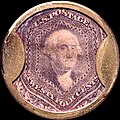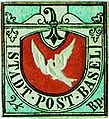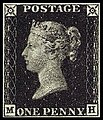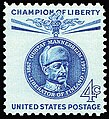Portal:Philately
| Philately portal | WikiProject Philately |
The Philately Portal
Philately is the study of revenue or postage stamps. This includes the design, production, and uses of stamps after they are issued. A postage stamp is evidence of pre-paying a fee for postal services. Postal history is the study of postal systems of the past. It includes the study of rates charged, routes followed, and special handling of letters.
Stamp collecting is the collecting of postage stamps and related objects, such as covers (envelopes, postcards or parcels with stamps affixed). It is one of the world's most popular hobbies, with estimates of the number of collectors ranging up to 20 million in the United States alone.

The 2009 Royal Mail industrial disputes is an industrial dispute in the United Kingdom involving Royal Mail and members of the Communication Workers Union (CWU), which began in the summer of 2009. It was the country's first industrial action involving postal workers since 2007 and came about after the Communication Workers Union accused Royal Mail of refusing to enter into dialogue regarding how the implementation of modernisation plans would affect the job security of postal workers.
The strike action began on a local level after postal workers at Royal Mail offices in London and Edinburgh accused their bosses of cutting jobs and services, which they claimed broke the 2007 Pay and Modernisation Agreement, the agreement that was struck to end the 2007 strikes, and accused Royal Mail of threatening modernisation of the service. After a series of localised walkouts over the summer months, and after failing to reach an agreement, the CWU opened a national ballot for industrial action in September 2009. (Full article...)
Selected article -
The Air Mail scandal, also known as the Air Mail fiasco, is the name that the American press gave to the political scandal resulting from a 1934 congressional investigation into the awarding of contracts to certain airlines to carry airmail and the subsequent disastrous use of the U.S. Army Air Corps (USAAC) to fly the mail after the contracts were revoked.
During the administration of U.S. President Herbert Hoover, Congress passed the Air Mail Act of 1930. Using its provisions, Postmaster General Walter Folger Brown held a meeting with the executives of the top airlines, later dubbed the "Spoils Conference", in which the airlines effectively divided among themselves the air mail routes. Acting on those agreements, Brown awarded contracts to the participants through a process that effectively prevented smaller carriers from bidding, resulting in a Senate investigation. (Full article...)
Selected images
Did you know (auto-generated)

- ... that working at a post office was how Derrick Harden became an NFL player?
- ... that both of Karl R. Free's New Deal-era U.S. post office murals with Native American subjects have been challenged as offensive?
- ... that a new Christmas stamp that debuted in the 350-person town of Bethlehem, Georgia, in 1967 got so much attention that the two-employee post office had to hire forty-three temporary workers?
- ... that after Irish post office clerk Maureen Flavin Sweeney reported worsening weather conditions, Dwight D. Eisenhower agreed to postpone D-Day by 24 hours?
- ... that James Diossa rescued the only public library and post office in Central Falls, Rhode Island, when the city went into bankruptcy?
- ... that Amrita Sher-Gil's painting Hill Women appeared on a 1978 Indian postage stamp?
General images -
Selected stamp -

The Dag Hammarskjöld invert is a 4 cent value postage stamp error issued on 23 October 1962 by the United States Postal Service (then known as the Post Office Department) one year after the death of Dag Hammarskjöld, Secretary-General of the United Nations, in an airplane crash. The stamp, showing the yellow background inverted relative to the image and text, is also known as the Day's Folly after Postmaster General J. Edward Day who ordered the intentional reprinting of the yellow invert commenting, "The Post Office Department is not running a jackpot operation."
The stamp reprint was in effect a deliberate error produced by the Post Office Department to avoid creating a rarity. It was decided to reprint 40 million of the inverted stamps after the discovery of the error so there would be no rarity factor in the inverted stamp and to prevent people profiting from the Postal Service's mistake. The reprints were issued to the public on 16 November and described as a Special Printing. (Full article...)
List articles

- List of philatelists
- List of most expensive philatelic items
- List of postage stamps
- Lists of people on postage stamps (article) • (Category page)
- List of entities that have issued postage stamps (A–E)
- List of entities that have issued postage stamps (F–L)
- List of entities that have issued postage stamps (M–Z)
- List of postal services abroad
- Timeline of postal history
Related portals
Topics
Categories
WikiProject
![]() WikiProject Philately organizes the development of articles relating to philately. For those who want to skip ahead to the smaller articles, the WikiProject also maintains a list of articles in need of improvement or that need to be started. There are also many red inked topics that need to be started on the list of philatelic topics page.
WikiProject Philately organizes the development of articles relating to philately. For those who want to skip ahead to the smaller articles, the WikiProject also maintains a list of articles in need of improvement or that need to be started. There are also many red inked topics that need to be started on the list of philatelic topics page.
Selected works
- Williams, Louis N., & Williams, Maurice (1990). Fundamentals of Philately {revised ed.). American Philatelic Society. ISBN 0-9335-8013-4.
{{cite book}}: CS1 maint: multiple names: authors list (link) - Hornung, Otto (1970). The Illustrated Encyclopedia of Stamp Collecting. Hamlyn. ISBN 0-600-01797-4.
- Stuart Rossiter & John Fowler (1991). World History Stamp Atlas (reprint ed.). pub: Black Cat. ISBN 0-7481-0309-0.
Wikimedia
The following Wikimedia Foundation sister projects provide more on this subject:
-
Commons
Free media repository -
Wikibooks
Free textbooks and manuals -
Wikidata
Free knowledge base -
Wikinews
Free-content news -
Wikiquote
Collection of quotations -
Wikisource
Free-content library -
Wikiversity
Free learning tools
Other Portals
Sources
- ^ "Philatelic Collections: General Collections". British Library. 2003-11-30. Archived from the original on 30 June 2011. Retrieved 2011-01-16.











![Image 9Unissued 1956 £1 Jamaican chocolate and violet, the first stamp designed for Queen Elizabeth II. Held in the British Library Crown Agents Collection.[1]](http://upload.wikimedia.org/wikipedia/commons/thumb/9/9b/Stamp_Jamaica_1956_unissued_1sh.jpg/120px-Stamp_Jamaica_1956_unissued_1sh.jpg)


















































